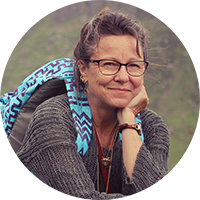Doula Profile: Colleen Harris
by INELDA

Colleen Harris
Colleen Harris taught writing and literature at middle and secondary school levels for 34 years. In retirement, Colleen has become a shamanic Reiki practitioner and master teacher, is currently in the end-of-life doula certification process with INELDA, and enjoys life in Boynton Beach, Florida, with her retired teacher husband and cat Rey.
When and why did you decide to become an end-of-life doula? I took the Art of Dying Institute course at the Open Center in New York City years ago. I did not know about EOL doulas at the time—I simply felt drawn to study death. With each session, I became more and more certain something was waiting for me to discover. When Henry Fersko-Weiss gave his seminar on doulas, I knew. I just knew this was the work I was being called to. I remember speaking with him privately during the lunch break, full of excitement and gratitude, telling him this was my calling. His smile of understanding was everything to me.
How long have you been doing this type of work? About 10-plus years studying and preparing. My first client was six years ago.
What type of environment do you work in? Wherever I am called. Mostly hospice, but I have worked with clients in their homes as well. My last client and I met at a local park twice a week.
What do you do before you meet with a new client? I meditate, pray, and give myself Reiki. I also make offerings at bodies of water, in gardens, in air, or I bury or burn an intention. I am a shamanic Reiki practitioner, and I have found that rituals and offerings ground me as well as give me insight.
Can you share a short anecdote or insight that changed you? Playing music and singing with my clients connects our hearts in a way words cannot. I remember an Irish-born nun I worked with would sing and move her feet, legs, hands, and head along with the old Irish music I brought—and she requested the “colorful” bar songs she sang with her father and siblings on their sheep farm in County Roscommon at the turn of the century. Who was I to deny this pious, religious, dying woman her last requests, even though they were a bit risqué and bawdy? Of course, colorful and bawdy songs from that time relied on metaphor and context more than they do nowadays. This was in a convent facility, after all!
Who has been one of your teachers or mentors? Henry was my first doula teacher. How he blended matter-of-factness with deep compassion was revelatory for me. I don’t mean to sound egotistical when I say this, but I had always been like that, and I had never met anyone else with that combination. Fearful I would be judged as callous, I never felt comfortable sharing those perspectives with anyone in my life—that is, until I met Henry and recognized myself in him. I found a tribe member in him, I suppose.
What do you wish you had known when you started as a doula? There can be laughter and joy in the dying process. Death is a hug, not a blow.
Do you have any words of encouragement for fellow doulas? Just show up as a fellow mortal. And you’re not responsible for the type of death a client experiences. Show up for what shows up.
What is your dream for your practice or doulas in general? I often catch myself imagining a future world where death is not feared, but accepted as another life experience, like the Celts and Vikings viewed it. I also envision a world where a person’s life is celebrated when they die. We need a new genre of songs, with lyrics that honor what the dead person added to the world and what obstacles were overcome, what wisdom was gained and modeled. Yes, it’s sad when we lose someone, and that’s to be honored; there’s also how they added to our lives. Death is not subtraction; I see it as an equal sign ( = ).
Contact Colleen: [email protected]
The opinions expressed in this article are those of the authors. They do not purport to reflect the opinions or views of INELDA or its staff.
